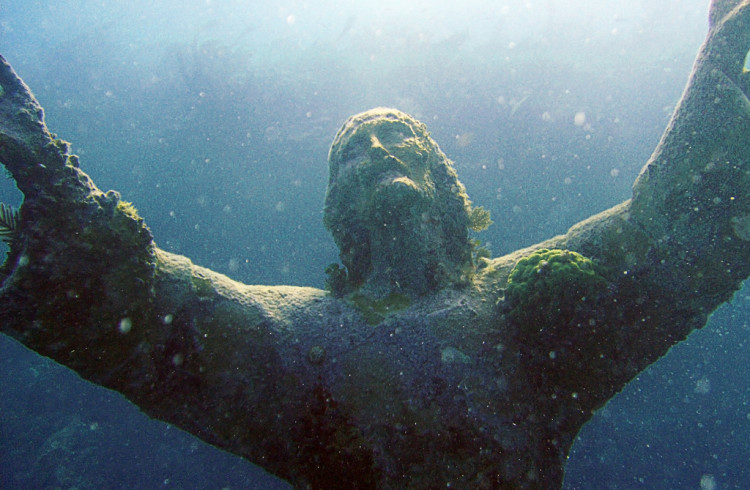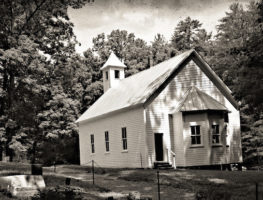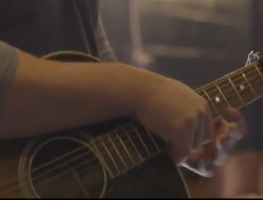We have all recently beheld the eruption of angst from evangelicals, some who have seemingly emerged from the woodwork, inconveniently jolted awake from their political slumber by an election season that has gone too far.
I wonder what this phenomenon reveals about us. I wonder if it reveals, after all, that evangelicals – especially the segment that usually avoids commentary on presidential candidates – truly do not have a better option, a thicker imagination, for how to embody the fullness of God’s kingdom when we’re not in power.
Fortunately, others evangelical voices have reminded us there is a better way, another option for Christian faithfulness. The church is a political entity – a social body that participates in Christ’s body and also exists in the real world as a witness and sign of Christ’s presence and kingdom for the sake of the world. If this is true, then we would want to be concerned not only with what that politic looks like but also how to be formed into and for that politic.
How Does a Church Become “Resident Aliens”?
Perhaps you are a pastor in a local community of believers, and you are energized by this alternative way of faithfulness – this vision of the church as “resident aliens.” But you are also left wondering, “how does this happen on the ground in my context?”
How does this happen in communities where the nuances of political theory and theology are lost, and that kind of talk comes off as confusing, pretentious, or even threatening?
How do we lead a community into an alternative politic when that community is already entrenched in the partisan politic divide and folks just want you to tell them who or who not to vote for?
I submit, simply, that we lead people in worship. To be come 'resident aliens,' I submit, simply, that we lead people in worship. Click To Tweet
You may have heard those issuing this ecclesial-political clarion call describe leadership as being a “community organizer for God’s kingdom.” The point of this proposal is not to say anything less than that, but to highlight the reality that a community organizer, if she is organizing for God’s Kingdom in Christ, must also see herself as a worship leader.
This proposal emerges first of all from the conviction that worship is the primary activity and context in which we are formed as witnesses into Christ’s likeness for his mission. Put another way, worship itself is a political act. Worship itself is a political act. Click To Tweet
Worship Takes Us Places
The way beyond the antagonism and emptiness of partisan ideology and into the fullness of Christ is the way of worship. The way of faithfulness amidst the broken political system of our age – amidst the powers and principalities at work in the social structures around us – is doxological to the core.
Leading a community in worship is a critical task for embodying an alternative politic on the ground because worship is how we evacuated space for a particularly Christian political presence in the world in the first place.
People in our congregations didn’t wake up one morning and randomly choose to peddle their political soul to the Religious Right (or Left). No, we were formed into ideological lack by habitually giving ourselves over to cultural liturgies (that is, patterns of daily life oriented under a particular vision of human flourishing) forged within a particular partisan, Western political narrative. We worshiped our way here.
Habits of Worship
Our habits of worship – those rhythms that characterize our daily lives as well as what we do on Sunday morning – have been (unwittingly, perhaps) shaped by a narrative that concedes too much to Caesar. We have been inculcated by an anemic gospel that domesticates the kingdom.
We worshiped our way in, and we will worship our way out. We need to be re-scripted into the one, true narrative that proclaims Jesus as Lord, the conquering Lamb, who reigns over all things. We need the announcement of the Good News of a new social reality in Christ imbibed into our bones.
This is not a short-term, quick results strategy. This is not an apologetic slight of hand we can wield to convince the haters before election day during this cycle. This is, rather, how we form a community who lives under Jesus’ lordship over the long haul, which means there will be many seasons where we as leaders feel like we’re not seeing fruit.
During these seasons, we must remember the notion that worship has implications for our political posture in the world will require a paradigm shift for many evangelicals for whom worship functions on a different level, in a different realm, separate from the space in which politics exists.
These are the times when quoting Hauwerwas is good, but even better is leading the community into regular, daily practices of worship that celebrate the reality of God’s reign in Christ by the Spirit. Because of the power of the old paradigm, leading will involve intentionally drawing attention, through word and deed, to how those daily patterns of worship are fundamentally connected to the way God is renewing and transforming the “real world,” not as secondary work prior to the world. Quoting Hauwerwas is good, but leading the community into regular practices of worship is better. Click To Tweet
Nothing I’m suggesting is novel. I am simply describing the logic for becoming the type of people who are able to discern and participate in the divine will. Perceiving the world and then inhabiting the world as it truly is in Christ is the result of a spiritual transformation grounded the body’s liturgical action (see Romans 12:1-2).
The Politics of Baptism and Eucharist
The kind of worship leading I’m describing, where the church is able to be a politic of the risen Christ, is illustrated well in the liturgical practices of Baptism and Eucharist.
In baptism, the Spirit inducts us into a new social reality – a new humanity – a new creation – a new community of God’s reconciliation in Christ.
In baptism we are acknowledging that something has already happened cosmically. God has already inaugurated the New Age in Christ by the Spirit, and we are included as members. We are not simply affirming a personal decision we made.
An implication of being included in this new reality, embracing a new corporate identity as citizens of God’s kingdom, is that we forsake old allegiances. The old social markers no longer have primary bearing on our identity and being-in-the-world.
Baptismal Politics
In the baptismal liturgy, we reject and renounce the old self as well as the demonic systems of the old world, and turn to confess and embrace Jesus’ lordship – pledging not just our personal, interior belief but also the whole of our lives in allegiance to his kingdom. In this act the Apostles’ Creed becomes our new pledge of allegiance. We are explicitly affirming that we cannot live in two kingdoms or serve two masters.
Moreover, baptism is both an initiatory and ongoing practice. We are continually owning our baptismal identity – embracing our new humanity – learning how to be God’s people in the real space we inhabit. Rather than a privately held rite that has to do only with our inner transformation, or even an “insider” badge of privilege, in our baptism we are (continually) going public with our conversion. We are going public with a Spiritual unity possible because of the demolition of hostility and separation on the cross.
The point is that when we engage in initiatory and ongoing baptismal liturgies, we are being formed into and for God’s reconciliation in the real places we inhabit. Baptismal liturgies train us for seeking reconciliation one-to-another, and when we go out at seek that reconciliation, we are living into our baptism. We don’t “get baptized” and then do politics. We daily own our baptism, living as citizens of the one, true Kingdom – witnessing to Jesus’ lordship in the real world. We daily own our baptism, witnessing to Jesus’ lordship in the real world (and it's politics). Click To Tweet
Eucharistic Politics
In the Eucharist (or the Lord’s Supper, whatever you want to call it), like in Baptism, the Spirit brings us into the eschatological tension of this world and the world to come. In this tension, we celebrate in real time the fullness of time. In the bread and wine, we feast on the firstfruits of new creation and are progressively being formed into the body of Christ.
That is, in this ongoing act of thanksgiving, we are taking on the image of God’s goal for history. We do not know or control how the Spirit is manifesting this reality among us, but the Eucharist is, nonetheless, a liturgical act that has to do with the real world. We do not farm-out the “public” part of our life to the State, but rather allow the Eucharist to train us as peculiar witnesses of the righteousness and peace of Christ in the world. Eucharist is an ongoing act of thanksgiving, taking on the image of God’s goal for history. Click To Tweet
How God is Transforming the World
The point is that this act of surrender, this incorporation into Jesus’ death and resurrection, is not incidental to what is happening in the real world or how God is working in the world. It is, rather, the image and means by which he is transforming the world.
Remembering his death until he comes, therefore, is not for us merely an introspective, cognitive game we play in “the meantime.” When we remember his death until he comes, the historical death and resurrection of Christ and his future kingdom crash into the present, making possible a particularly cruciform politic that we can embody for the sake of the world.
In summary, laying the groundwork for a particularly Christian political posture in a local community looks like leading worship.
[Photo by vgm8383, CC via Flickr]








Missio Alliance Comment Policy
The Missio Alliance Writing Collectives exist as a ministry of writing to resource theological practitioners for mission. From our Leading Voices to our regular Writing Team and those invited to publish with us as Community Voices, we are creating a space for thoughtful engagement of critical issues and questions facing the North American Church in God’s mission. This sort of thoughtful engagement is something that we seek to engender not only in our publishing, but in conversations that unfold as a result in the comment section of our articles.
Unfortunately, because of the relational distance introduced by online communication, “thoughtful engagement” and “comment sections” seldom go hand in hand. At the same time, censorship of comments by those who disagree with points made by authors, whose anger or limited perspective taints their words, or who simply feel the need to express their own opinion on a topic without any meaningful engagement with the article or comment in question can mask an important window into the true state of Christian discourse. As such, Missio Alliance sets forth the following suggestions for those who wish to engage in conversation around our writing:
1. Seek to understand the author’s intent.
If you disagree with something the an author said, consider framing your response as, “I hear you as saying _________. Am I understanding you correctly? If so, here’s why I disagree. _____________.
2. Seek to make your own voice heard.
We deeply desire and value the voice and perspective of our readers. However you may react to an article we publish or a fellow commenter, we encourage you to set forth that reaction is the most constructive way possible. Use your voice and perspective to move conversation forward rather than shut it down.
3. Share your story.
One of our favorite tenants is that “an enemy is someone whose story we haven’t heard.” Very often disagreements and rants are the result of people talking past rather than to one another. Everyone’s perspective is intimately bound up with their own stories – their contexts and experiences. We encourage you to couch your comments in whatever aspect of your own story might help others understand where you are coming from.
In view of those suggestions for shaping conversation on our site and in an effort to curate a hospitable space of open conversation, Missio Alliance may delete comments and/or ban users who show no regard for constructive engagement, especially those whose comments are easily construed as trolling, threatening, or abusive.